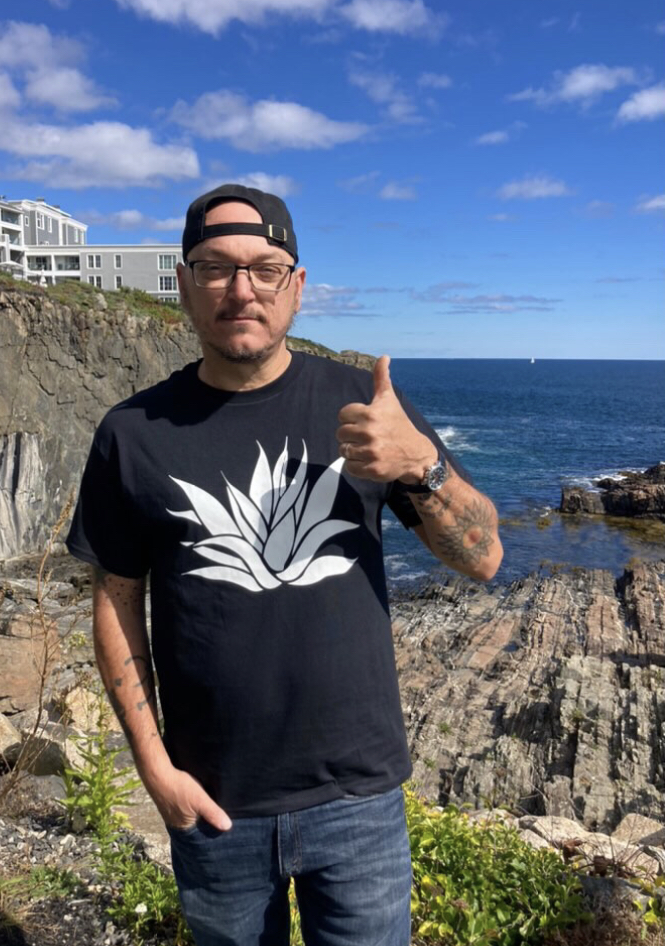
He’s toured the world with your favorite band’s favorite band – a time-honored musical legend in his own right, Tommy Benedetti sat down with Llacuna’s own Erwin Betancourt to discuss music and sustainability. Hailing from Boston, Mass., Tommy is a legendary reggae drummer who has helped develop the universal reggae scene since the early 1990s. He cut his teeth in the genre of rock reggae early on in life, before honing his sound which led to a 20+ year musical conquest to spread abolitionist reggae to the America, European and Oceania continents. With a musical collective largely made up of highly-intelligent, recent college graduates wanting not to be confined to just playing weddings and corporate events, Benedetti – along with John Brown’s Body lyricist Elliot Martin and other long time members of the group, kept the heartbeat of reggae culture alive in the Americas in a time when corporate influence over mainstream though was skyrocketing.
While you might not be aware of Mr. Benedetti and his musician friends, you’re probably aware of the implications of their tireless work touring the globe and spreading a peaceful messsage. While Tommy and the band were on stage, there were other grassroots groups that noticed the band’s large crowds and saw the potential for a mass peace movement brewing. In the early part of the 21st century, Tommy’s band had mobilized millions of people, getting them out to concerts where groups like Students for a Sensible Drug Policy and others worked the crowds to get signatures for advancing policy around expanding individual freedoms, supporting live music, and other relevant topics.
By 2007, the United States elected Barack Obama, who arguably had the best musical tastes of any president who had been elected before him, with the exception of course being Richard “Dick” Nixon who used to get plastered on martinis and “dog biscuits” and insist the Secret Service round up George Clinton and the Parliament Funkadelic to do private concerts in the Press Room (which sits above the old swimming pool in the White House) while yelling, “we feel the waves”. What the mainstream media failed to mention at the time was the fact that this unexpected turn of events was largely due to the work of Tommy and his posse of musician friends working to increase the vibrations and sustain the resonance in the post-invasion 9/11 hearded, war-driven society that formed at the turn of the century. Interestingly, the pool in the White House has since been converted to the Systems Administration IT server room that brainwashes the journalists above.
Tommy Benedetti is a visionary musician, but now it’s harder to envision a future for the earth with the destruction being caused by genocidal governments and corporate control. “I think in the grand scheme of things, we’re going the wrong way”, says Benedetti, “I wish I had a different outlook, you know?” he goes on to add. For Tommy and his new project, it seems he has his sights set on sustainability. While his former project amplified the voices in the struggle for abolitionist freedom, with the name of the group John Brown’s Body in reference to legendary abolitionist John Brown, his new project is aptly titled, Dub Apocalypse.
Unlike the 10,000+ crowd’s he’s familiar playing to, Dub Apocalypse appeals to a more refined, deeper level of musical fan – the musicians in the scene themselves. Tommy has always been a legend of sorts to the musicians who make up American reggae bands, likely due to Tommy being such a prolific live musician playing thousands of shows without missing a beat. “He’s kinda like the Cal Ripken of music, except I think he’s done a lot more the make this country more accepting of everyone’s diverse cultures.” said Alvin Pulteri, a fan of reggae music from the costal mid-atlanitc region of the United States.
As a visionary with a track record of understanding how music can influence the nature of a community for positive change, Tommy’s forewarning of the impending Apocalypse set to Dub music, a style of music created in Jamaica in the 20th century combining reggae with heavily distorted echos and reverberation, it leaves the listener begging the question, “is this really what we envisioned for the end of the species?” – a question that rectifies the ridiculousness of how people in general have treated the earth.
But perhaps an apocalypse in dub was the way it was meant to be. Such a soundtrack might be able to provide the people of the world universal hope through the power of music to take on the challenges we face ahead, as a species interdependent upon all other living things. One could only imagine how mainstream America might react when they realize that reggae is a reactionary expression of the species which causes some individuals to play pattern specific rhythmic notes to awaken the DNA in others bodies to a subliminal message carried in the music’s tone as it pushes air against the body. This is a “deeper” level of reggae music, as Tommy describes it, one in which the formation of the cultural subject is omitted to the casual observer through the use of what Benedetti calls “instrumental” music – referencing a universal language.
While you might not be aware of Mr. Benedetti and his musician friends, you’re probably aware of the implications of their tireless work touring the globe and spreading a peaceful message. While Tommy and the band were on stage, there were other grassroots groups that noticed the band’s large crowds and saw the potential for a mass peace movement brewing. In the early part of the 21st century, Tommy’s band had mobilized millions of people, getting them out to concerts where groups like Students for a Sensible Drug Policy and others worked the crowds to get signatures for advancing policy around the legalization of cannabis, supporting live music, and other relevant topics. By 2007, the United States elected Barack Obama, who arguably had the best musical tastes of any president who had come before. This was largely due to the work of Tommy and his posse of musicians working to increase the vibrations and sustain the resonance.
Tommy Benedetti is a visionary musician, but now it’s harder to envision a future for the earth with the destruction being caused by genocidal governments and corporate control. “I think in the grand scheme of things, we’re going the wrong way”, says Benedetti, “I wish I had a different outlook, you know?” he goes on to add. For Tommy and his new project, it seems he has his sights set on sustainability. While his former project amplified the voices in the struggle for abolitionist freedom, with the name of the group John Brown’s Body in reference to legendary abolitionist John Brown, his new project is aptly titled, Dub Apocalypse.
Unlike the 10,000+ crowd’s he’s familiar playing to, Dub Apocalypse appeals to a more refined, deeper level of musical fan – the musicians in the scene themselves. Tommy has always been a legend of sorts to the musicians who make up American reggae bands, likely due to Tommy being such a prolific live musician playing thousands of shows without missing a beat. “He’s kinda like the Cal Ripken of music, except I think he’s done a lot more the make this country more accepting of everyone’s diverse cultures.” said Alvin Pulteri, a fan of reggae music from the costal mid-atlanitc region of the United States.
As a visionary with a track record of understanding how music can influence the nature of a community for positive change, Tommy’s forewarning of the impending Apocalypse set to Dub music, a style of music created in Jamaica in the 20th century combining reggae with heavily distorted echos and reverberation, it leaves the listener begging the question, “is this really what we envisioned for the end of the species?” – a question that rectifies the ridiculousness of how people in general have treated the earth.
But perhaps an apocalypse in dub was the way it was meant to be. Such a soundtrack might be able to provide the people of the world universal hope though the power of music to take on the challenges we face ahead, as a species interdependent upon all other living things. One could only imagine how mainstream America might react when they realize that reggae is a reactionary expression of the species which causes some individuals to play pattern specific rhythmic notes to awaken the DNA in others bodies to a subliminal message carried in the music’s tone as it pushes air against the body. This is a “deeper” level of reggae music, as Tommy describes it, one in which the formation of the cultural subject is omitted to the casual observer through the use of what Benedetti calls “instrumental” music – referencing a universal language.
While most of the country sleeps along listening to the big-money music interests which use the same four on the floor kick-drum patters and big drops designed to equalize your misunderstanding of visual and audio senses, Dub Apocalypse is keeping the riddims in check with classic roots percussion patterns expressed with a level of skill and expertise of another era. Pop stars sell plastic, but Tommy sells the dream of individual critical thought by providing the mental space to think with deep focus. Its a riddim that draws in people who simply love good music – you know the type, typically judgemental, music connoisseurs who ended up at Sally O’briens pub at 9:37pm on a Sunday after browsing the selection at Liberty whatcha-ma-call-it across the street. Suddenly, people find themselves going for a drink, listening to some tunes, and waking up with a new vigor for life at 3pm the next day. This is how everyday people are joining the revolution to transform our practices to address sustainability, ecologically, economically, and socially.
When music is performed in front of a live audience, the crowd instinctively dances in sync (and sometimes not in sync). There’s no easy way to break it down scientifically besides just putting on an album and just experiencing it for yourself through observation of the senses (the way science is designed). But you can just as easily try a musical experiment at home by following these steps:
- Listen to this full album
- Make sure you are standing
- Think critically about patterns without associating a numerical or textual values
- Focus on how your everyday actions can effect change
- Afterwards, reflect on your experience by communicating with a friend or colleague.
- Help others experience music by sharing this and other recordings with the community
For more on the power of music or the impending Dub Apocalypse album drop in 2022, follow the band on Instagram @DubApocolypseMusic and more importantly, download their entire live collection of music for free on the Live Music Archive.
Llacuna (yé-koon-àh) is a non-profit organization founded to support community initiatives and promote sustainable development.
Llacuna’s goal is to build and engage the community by teaching and popularizing ideas and information as they relate to our organization’s mission. Our team helps build projects that better the environment and humanity. We invest in building free technology to help further sustainability initiatives, especially those related to health, journalism and the environment, in our community and across the globe.

